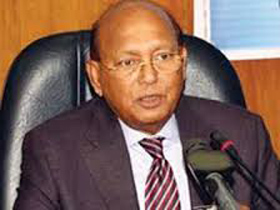USTR says Bangladesh must do more to get back the facility
Commerce Minister Tofail Ahmed yesterday termed the US decision to not restore GSP facility for Bangladesh “unfortunate” as a review concluded that Bangladesh must do more to address the workers rights and safety issues.
The report on the GSP review was made public on Wednesday.
“After the review, we understand that it is not possible for Bangladesh to satisfy the US,” Tofail told the Dhaka Tribune.
The review has no reflection of reality, the minister retorted.
“If such non-cooperation continues from the US side it may have negative impact on the execution of Ticfa,” Tofail said.
He said some non-workers are engaged in trade union activities and were creating problems.
US President Barack Obama suspended GSP facilities for Bangladesh last year and placed for Bangladesh a 16-point Action Plan which provides a basis for the president to consider the reinstatement of GSP trade benefits
The Office of the US Trade Representative (USTR) has reviewed the progress made in implementing the Action Plan and concluded
that Bangladesh has made some important progress but must do more to address the workers rights and their safety issues.
“The Obama administration has been engaging the Bangladesh government and stakeholders over the past year to press for changes to address the workers rights and workers safety issues that led to the president’s decision to suspend GSP trade benefits,” said United States Trade Representative Michael Froman.
Washington remained concerned about the large number of factories that are yet to be inspected, the lack of progress on needed labour law reforms, and continuing reports on harassment and violence against labour activists who are attempting to exercise their rights, Froman said.
Tofail Ahmed had a meeting with Froman in Washington last month and discussed about restoration of GSP facility for Bangladesh.
After coming back, Tofail at a press conference said he was hopeful that GSP would be restored as Bangladesh had fulfilled most of the conditions in the Action Plan.
Tofail said it would be politically motivated decision if GSP was not restored.
However, the US review found that the government has not yet implemented substantial parts of the Action Plan.
The GSP sub-committee expects to carry out its next review of Bangladesh’s progress on the GSP Action Plan in December 2014.
The latest review said the government is behind schedule in carrying out many hundreds of critical safety inspections at garment factories as well as meeting its commitments to hire additional inspectors.
The government has also been slow to respond to continuing reports of harassment and violence against labour activists, it added.
“The review concluded that the government needs to develop a credible and effective mechanism for responding to and addressing allegations of unfair labor practices.”
Since the suspension of GSP, the government has also not advanced the labour law reforms called for in the Action Plan, including changes to ensure that workers are afforded the same rights and protections in Export Processing Zones as in the country, it said.
The decision to suspend Bangladesh’s trade benefits under the GSP programme means that US imports of GSP-eligible products from Bangladesh are no longer eligible for duty-free treatment.
In 2012, the total value of US imports from Bangladesh under GSP was $34.7 million and the top GSP imports from Bangladesh included tobacco, sports equipment, porcelain china, and plastic products.
Legal authorisation for duty-free treatment for all countries under GSP expired on July 31, 2013. Congress is considering legislation to renew the programme.
Source: Dhaka Tribune










